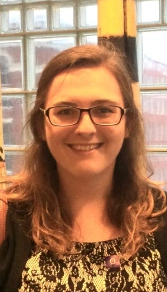Meet Meredith McInturff! She is a public health and Spanish double major who attended the Women in STEM Policy seminar in January 2016.

Describe yourself and why you wanted to attend the PLEN Conference.
I am constantly looking for opportunities to expand my knowledge about careers within my field. Public health takes an interdisciplinary approach to address the well-being of a population—integrating science, technology, and statistics to analyze health issues and to provide solutions. I’m interested in how STEM policy affects the creation of alternatives or solutions in healthcare. Understanding how population health is discussed in government settings was another main goal I had from attending this seminar. The Women in STEM Policy seminar was the perfect opportunity to gain a familiarity with how STEM issues are addressed in DC and to meet the professionals tackling these issues on a daily basis.
Describe your favorite parts of the conference.
Meeting other STEM undergraduate and graduate level women from academic institutions across the country was one of my favorite parts. It was a chance to meet people at various points in their education and to figure out the reasons why they were passionate about STEM. Some students had very similar interests to me and others did not. However, we all supported each other’s interests and plan to work toward increasing women’s participation in STEM fields and create sound policies to advance STEM projects in the future.
Who was your favorite speaker? Did you have a favorite job site?
The trip to National Institutes of Health campus in Bethesda was the pinnacle experience of the trip. This institution produces a bulk of the biomedical research that influences public health initiatives and policies in our country. My favorite speaker at this site was Dr. Gaya Dowling, the Director of the Adolescent Brain and Cognitive Development Program within the National Institute on Drug Abuse. She discussed her current work within her program, as well as the opportunities and the issues surrounding large-scale longitudinal studies. Her passion for her work was evident within her presentation and it was inspiring to meet a woman researcher dedicated to increasing the public’s knowledge about the development of the adolescent brain.
What do you hope to never forget?
If I could only remember one lesson from this conference, it would be “there is not a ‘correct’ way to achieving your goals.” Most of the women who spoke to us did not have a straightforward path into the career and many are not using their knowledge from undergrad on a daily basis. This lesson served as a reminder to me that it is important to be ambitious and constantly learning, but different life experiences shape the opportunities you will have in the future. Being open to change is extremely important and STEM fields are constantly evolving, so it’s important to keep your options open.
Why should other students attend a PLEN conference?
More women should attend PLEN conferences because they provide a unique opportunity for undergraduate and graduate students to connect with professionals who want to share their experiences and invest their valuable time. The number of professionals who spent hours preparing presentations and answering questions for our group was astounding and I could not imagine another setting where these types of interactions would be possible. It was great exposure to a variety of career fields that were both within and outside the traditional STEM path. I would not have traded my experience at PLEN for any other conference.
Does this sound like something you might be interested in? Tulane undergraduate students can apply to NCI for funding to attend PLEN conferences. Email Betsy Lopez at elopez@tulane.edu for more information.
Responses have been lightly edited for length and clarity.
